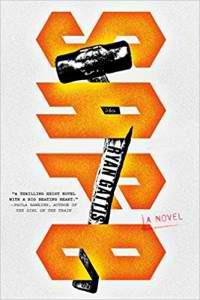The Saboteur by Andrew Gross
 Wednesday, August 30, 2017 at 9:57AM
Wednesday, August 30, 2017 at 9:57AM 
Published by St. Martin's Press/Minotaur Books on August 22, 2017
Kurt Nordstrum is part of the Norwegian resistance, or what remains of it in 1942. He crosses Lake Tinnsjo from Tinnoset to Mael, near the place where he grew up, because he has been asked to accompany Einar Skinnarland on a mission to smuggle microfilm to a Norwegian scientist in London. The microfilm concerns details of atomic bomb research that the Germans are conducting in Norway.
Carrying out the mission requires the men to hijack a Norwegian steamer and make their way past the German coastal command. After that, Nordstrum's mission is to sabotage the plant that is manufacturing the raw materials Germany needs to make an atomic bomb. And after that, Nordstrum’s role in the war is to recruit more spies in Norway, until he is given a final mission that will change the course of the war.
All of that is interesting, but it should be harrowing. Andrew Gross’ writing style is matter-of-fact, and at least until the novel’s ending, a bit dry. Still, if the story isn’t as riveting as it could have been, it does convey a sense of how weather plays a critical role in war in places like Norway, where people who are familiar with adverse conditions can turn them to their own advantage.
A love story appears near the end of the novel, although the characters hardly know each other long enough to feel any semblance of love. The novel’s characters have about as much development as they need. Nordstrum has a generic war hero’s personality and the other characters play equally generic roles.
The novel’s ending is melodramatic, although it will appeal to fans of the movie Titanic. I enjoyed The Saboteur more for its atmosphere and its setting in history than for the way the story is told. The novel has value precisely because it is based on actual events — and I enjoyed reading it for that reason — but the truth of history is more compelling that the predictable and melodramatic way in which the story is fictionalized.
RECOMMENDED WITH RESERVATIONS



